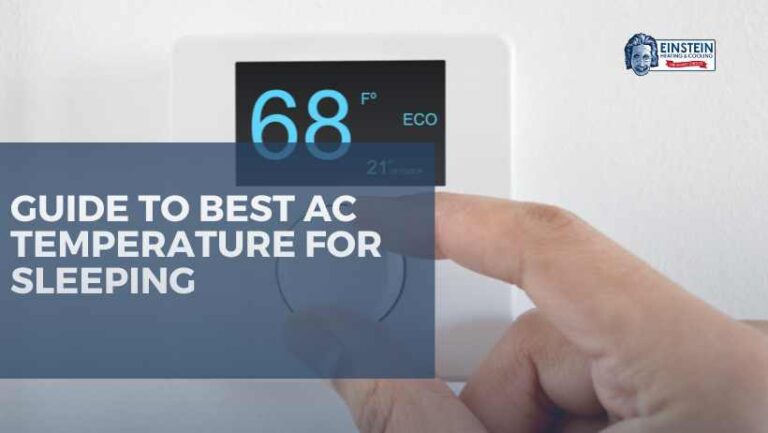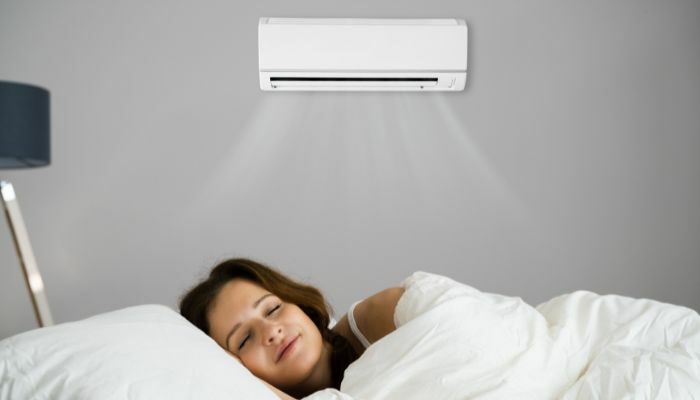Best Ac Temperature For Sleeping Florida

Frequently Asked Questions: Best AC Temperature for Sleeping in Florida
Finding the perfect AC temperature for a good night's sleep can be tricky, especially in Florida's humid climate. This FAQ addresses the most common questions we receive to help you create a comfortable and sleep-promoting environment.
Q1: What is generally considered the best AC temperature for sleeping?
The generally recommended temperature range for sleep is between 60-67 degrees Fahrenheit (15.5-19.4 degrees Celsius). This range supports the body's natural temperature regulation process, which dips slightly as you fall asleep. However, personal preferences play a significant role.
Q2: Why is it harder to sleep in Florida's heat and humidity?
Florida's high heat and humidity make it difficult for your body to cool down efficiently. Here's why:
- Heat: Elevated temperatures prevent your core body temperature from dropping, a crucial step for initiating sleep.
- Humidity: High humidity hinders sweat evaporation. Sweat evaporation is the body's primary cooling mechanism. When sweat can't evaporate, you feel hotter and more uncomfortable.
- Discomfort: The combined effect of heat and humidity can lead to restlessness, increased heart rate, and difficulty falling asleep.
Air conditioning is essential in Florida to combat these issues and create a sleep-conducive environment.
Q3: Does the "ideal" temperature change based on individual factors?
Absolutely. The ideal AC temperature for sleep is highly individual and can be influenced by several factors:
- Age: Infants and the elderly often require slightly warmer temperatures.
- Sex: Women generally have a higher body temperature than men and may prefer a slightly warmer sleep environment.
- Health conditions: Certain medical conditions can affect body temperature regulation and sleep preferences.
- Bedding: Thicker blankets and heavier bedding will require a lower AC setting.
- Personal preference: Some people simply prefer to sleep warmer or cooler than others.
The best approach is to experiment within the recommended range (60-67°F) to find what works best for you.
Q4: What are some tips for optimizing my AC settings for better sleep in Florida?
Here are some practical tips for optimizing your AC settings to improve sleep quality:
- Programmable Thermostat: Use a programmable thermostat to automatically lower the temperature a few hours before bedtime and raise it again in the morning.
- Ceiling Fans: Utilize ceiling fans in conjunction with your AC. Fans circulate air, enhancing the cooling effect and allowing you to set the AC a degree or two higher.
- Smart Thermostats: Consider a smart thermostat that learns your sleep patterns and adjusts the temperature accordingly. Some even track sleep quality.
- Consistent Temperature: Maintain a consistent temperature throughout the night to avoid waking up due to temperature fluctuations.
- Regular AC Maintenance: Ensure your AC unit is properly maintained with regular filter changes and servicing to guarantee optimal performance and energy efficiency. A dirty filter restricts airflow and reduces cooling capacity.
- Bedroom Placement: If possible, position your bed away from direct sunlight or drafts.
- Consider a Dehumidifier: If humidity is a major issue, a dehumidifier can help remove excess moisture from the air, making you feel cooler even at a slightly higher temperature.
- Bedding Choices: Opt for breathable, moisture-wicking bedding made from materials like cotton, linen, or bamboo. Avoid heavy, synthetic fabrics that trap heat.
Experiment with different settings and combinations of these tips to find what works best for you.
Q5: Is there a downside to running my AC all night in Florida?
While running your AC all night is often necessary for comfortable sleep in Florida, there are potential downsides to consider:
- Increased Energy Costs: Running your AC continuously will increase your electricity bill. Consider using a programmable thermostat or adjusting the temperature when you're away from home.
- Dry Air: Prolonged AC use can dry out the air, leading to dry skin, irritated sinuses, and respiratory problems. Using a humidifier can help counteract this effect.
- Maintenance Needs: Frequent use can increase the wear and tear on your AC unit, potentially requiring more frequent maintenance or repairs. Regular maintenance, including filter changes, is crucial.
- Environmental Impact: Increased energy consumption contributes to a larger carbon footprint. Consider energy-efficient AC units and practices to minimize your environmental impact.
Balancing comfort with energy efficiency and potential health concerns is key.
Q6: What are some alternatives to cranking up the AC for sleep?
If you're looking for ways to reduce your reliance on AC for sleep, consider these alternatives:
- Fans: As mentioned earlier, ceiling fans or portable fans can create a cooling breeze and improve air circulation.
- Cooling Mattress Toppers: Cooling mattress toppers made from gel-infused memory foam or breathable materials can help regulate body temperature.
- Cooling Pillows: Similar to mattress toppers, cooling pillows can help keep your head and neck cool throughout the night.
- Loose-Fitting Clothing: Wear loose-fitting, breathable sleepwear made from natural fibers.
- Cold Shower Before Bed: Taking a cool shower before bed can help lower your body temperature and promote relaxation.
- Stay Hydrated: Drink plenty of water throughout the day to help your body regulate its temperature.
- Blackout Curtains: Blackout curtains can block out sunlight and heat, helping to keep your bedroom cooler during the day.
- Proper Insulation: Ensure your home is properly insulated to prevent heat from entering during the day.
These methods can be used independently or in conjunction with your AC to create a more comfortable and energy-efficient sleep environment.
Q7: How can I tell if my AC temperature is affecting my sleep quality?
Pay attention to these signs, which may indicate that your AC temperature is negatively impacting your sleep:
- Restlessness: Tossing and turning throughout the night.
- Difficulty Falling Asleep: Taking a long time to fall asleep.
- Waking Up Frequently: Waking up multiple times during the night.
- Sweating or Chills: Experiencing excessive sweating or feeling cold under the covers.
- Fatigue: Feeling tired and groggy in the morning, even after getting a full night's sleep.
- Irritability: Feeling more irritable or short-tempered than usual.
If you experience any of these symptoms, try adjusting your AC temperature by a degree or two and see if it makes a difference. Keeping a sleep journal can also help you track your sleep quality and identify any patterns or correlations with your AC settings. If issues persist, consulting a sleep specialist can help address underlying medical issues.
By understanding the factors that influence sleep temperature and experimenting with different settings, you can find the optimal AC temperature for a restful and rejuvenating night's sleep in Florida.










